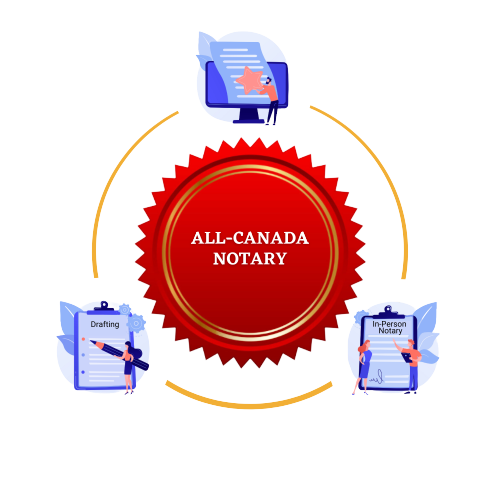Affidavit in Support of a Request for Reopening: If you’ve found yourself convicted of a provincial offense in Canada without having had your day in court, you have the option to request a reopening of your case. This process involves submitting an Affidavit in Support of a Request for Reopening—a notarized document asking a judge or justice for permission to have a trial. The Affidavit must be notarized for it to be recognized and processed by the provincial court, and All-Canada Notary can help you notarize it in-person or remotely.

What is an Affidavit in Support of a Request for Reopening?
An Affidavit in Support of a Request for Reopening is a notarized document that seeks the court’s permission to have a trial when you’ve been convicted by default for a provincial offense without having had your day in court.
Why do default convictions occur?
Default convictions can occur due to various reasons, such as not requesting a trial, not receiving a notice of trial, or failing to attend the scheduled trial.
How does a reopening differ from an appeal?
Reopenings and appeals serve different purposes. Appeals are filed after a trial has taken place and argue that the conviction should be overturned. Reopenings, on the other hand, are requested when you were convicted “in absentia” and did not have the opportunity to attend your trial. They ask the court to hold another trial so you can be present.
Can you appeal a default conviction?
Yes, default convictions can be appealed if you believe that you should not have been convicted. An appeal takes your case to the next court level, where a judge can overturn the conviction or order a new trial.
Who is eligible for a reopening?
Reopenings are available for individuals who have been convicted through no fault of their own and are within 15 days of learning about the conviction.
How can you request a reopening?
To request a reopening, follow these steps:
How can you check the status of a reopening?
You can check the status of a reopening by contacting [email protected] or by calling 416-338-7320. Additionally, you can use the Court Case Look Up service.
What are some common reasons for default convictions?
Default convictions often occur due to various factors, including:
- Lack of Awareness: Sometimes, individuals may not be aware that they need to request a trial, especially if they are not well-versed in legal processes or if communication from the court is missed.
- Administrative Errors: Errors in the court’s administrative processes, such as failing to send a notice of trial, can lead to default convictions.
- Personal Reasons: Life events, emergencies, or personal circumstances may prevent individuals from attending their scheduled trial.
- Miscommunication: In some cases, individuals may not have received essential communication from the court or may not have understood the significance of attending the trial.
Are there specific forms required for requesting a reopening?
Yes, when requesting a reopening, you’ll need to complete the appropriate court forms for submission and review by a Justice of the Peace. These forms can vary depending on your location within Canada and the type of provincial offense. It’s essential to obtain the correct forms from the local courthouse or their website and ensure they are filled out accurately.
What is the role of a Justice of the Peace in the reopening process?
A Justice of the Peace plays a crucial role in the reopening process. They will review your application, including your Affidavit in Support of a Request for Reopening and other relevant documents, to determine if your case meets the criteria for reopening. Their decision will determine whether your request proceeds to a new trial.
Can you represent yourself during a reopening process, or do you need legal counsel?
While it is possible to represent yourself during a reopening process, seeking legal counsel or advice from a legal professional is highly recommended. Legal experts can help you navigate the complexities of the legal system, ensure that you meet all requirements, and present your case effectively, increasing your chances of a successful reopening.
What happens after a reopening is granted?
If your request for a reopening is granted, a new trial will be scheduled where you can present your case and defend yourself against the charges. It is essential to prepare thoroughly for this trial, gather any evidence or witnesses you may need, and consult with legal counsel if possible to ensure the best possible outcome.
What if your reopening request is denied?
If your request for a reopening is denied, you may have limited options to challenge the conviction further. Consulting with legal counsel is crucial at this stage to explore any potential avenues for appeal or reconsideration.
Is notarization required for the Affidavit in Support of a Request for Reopening?
Yes, notarization is a crucial step in the process. The Affidavit in Support of a Request for Reopening must be notarized for it to be recognized and processed by the provincial court. Notarization ensures the authenticity and legality of the document, providing confidence to the court that the information presented is accurate and has been sworn to under oath.
Is it possible to notarize the affidavit remotely?
It is possible to notarize the affidavit remotely, and this can be done from the comfort of your home. With advancements in technology and the availability of online notary services, individuals can swear or affirm the affidavit in front of a notary public via video conferencing or online platforms. This provides a convenient option, especially for those who may face logistical challenges in visiting a physical notary office.
How can I notarize the affidavit remotely?
To notarize the affidavit remotely, you can follow these steps:
- Schedule your appointment online here
- During the appointment, you’ll be required to present your identification and the unsigned affidavit.
- The notary public will witness your signature and administer the oath or affirmation remotely through video conferencing.
- Once the affidavit is signed and notarized, the notary public will affix their seal and signature to the document.
Where can I download the Affidavit in Support of a Request for Reopening?
How Can We Help You?
We can help you complete the affidavit at one of our convenient in-person locations or with our online / remote commissioning services.


